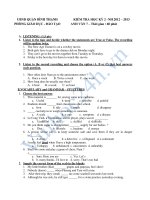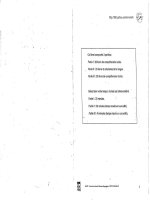MalcolmMann phrasalverbs 2013
Bạn đang xem bản rút gọn của tài liệu. Xem và tải ngay bản đầy đủ của tài liệu tại đây (3.59 MB, 56 trang )
Phrasal
verbs:
making
do
with
a
problema?c
area
or
coming
up
with
prac?cal
solu?ons?
Malcolm
Mann
13th
November
Macmillan
Online
Conference
2013
credits
• Longman
Grammar
of
Spoken
and
Wri2en
English
• Collins
Cobuild
Dic
Phrasal
Verbs
• Macmillan
English
Dic
• Des
/
B2
/
C1C2)
• Laser
(A1+
/
A2
/
B1
/
B1+
/
B2)
Ques?on
1
• How
do
your
students
generally
cope
with
learning
and
using
phrasal
verbs?
a
They
fall
behind.
b
They
get
by.
c
They
storm
ahead.
Ques?on
2
• How
do
you
personally
cope
with
learning
and
using
phrasal
verbs?
a
I
fall
behind.
b
I
get
by.
c
I
storm
ahead!
In
this
session…
• why
phrasal
verbs
are
par?cularly
troublesome
• how
we
can
start
to
understand
the
fundamental
logic
and
paLerns
behind
phrasal
verbs
• some
key
dos
and
don’ts
in
the
teaching
and
learning
of
phrasal
verbs
Defini?on
(mul?-‐word
verb)
• =
main
verb
+
par?cle(s)*
where
it’s
oTen
difficult
or
impossible
to
work
out
the
meaning
by
looking
at
the
individual
words
• *par?cle
=
adverb
or
preposi?on
or
verb
e.g.
Andy
and
I
don't
really
get
on.
compare:
She
came
down
the
stairs.
She
came
down
with
flu.
(free
combina
(mul<-‐word
verb)
mul?-‐word
verbs
• Phrasal
verbs
• Preposi?onal
verbs
• Phrasal
preposi?onal
verbs
• Verb
+
noun
(+
preposi?on)
• Verb
+
preposi?onal
phrase
• Verb
+
verb
Phrasal
verbs
verb
+
adverbial
par?cle
-‐
transi?ve
(takes
an
object):
I'll
turn
the
TV
on.
I'll
turn
on
the
TV.
I'll
turn
it
on.
X
I'll
turn
on
it.
-‐
intransi?ve
(doesn't
take
an
object):
Winter
is
seOng
in.
Preposi?onal
verbs
verb
+
preposi?on
She
looked
at
the
book.
The
wild
dog
almost
went
for
me.
I
came
across
a
really
interes
No
par?cle
movement
Phrasal
preposi?onal
verbs
phrasal
verb
+
preposi?onal
phrase
Get
away
?
Get
away
with
?
He
got
away.
=
escaped
He
got
away
with
the
diamonds.
=
escaped
He
got
away
on
a
motorbike.
=
escaped
He
got
away
with
murder.
=
escaped
punishment
for
Other
mul?-‐word
verbs
•
verb
+
noun
(+
preposi?on)
take
a
look
(at)
take
place
take
part
•
verb
+
preposi?onal
phrase
take
into
account
•
verb
+
verb
make
do
let
go
Numbers…
• 3000
mul?-‐word
verbs
approx?
• 5000-‐6000
meanings
approx?
• approx.
45
main
par?cles
aback
about
above
across
aTer
against
ahead
along
among
apart
around
aside
away
back
before
behind
below
beneath
between
beyond
by
down
for
forth
forward
from
in
into
off
on
onto
out
over
past
round
through
to
together
towards
under
up
upon
with
without
Many
coursebooks…
…present
phrasal
verbs
by
main
verb:
Write
a
phrasal
verb
in
the
correct
form
in
each
gap
to
complete
the
sentences.
take
for
take
in
take
off
take
over
take
up
How
should
we
present
and
teach
phrasal
verbs?
…
(1)
present/teach
phrasal
verbs
just
as
we
do
one-‐word
lexis:
within
a
topic
context
• travel
-‐
des?na?on
/
pack
/
suitcase
/
land
/
take
off
/
check
in
/
etc
• daily
ac?vi?es
–
wake
up
/
get
up
/
brush
teeth/
hair
/
get
dressed
/
etc
• communica?on
–
call
/
phone
back
/
get
through
/
/
etc
Encountering
new
phrasal
verbs
while
reading
• work
out
whether
it’s
a
phrasal
verb
or
not
• work
out
from
the
context
what
it
means
• understand
the
grammar
• understand
usage/register/formality
How
should
we
present
and
teach
phrasal
verbs?
…
(2)
present/teach
them
by
par?cle
• Par?cles
seem
random
but
they’re
not.
• The
more
that
students
can
understand
the
logic
and
meaning
behind
the
choice
of
par?cle,
the
easier
they’ll
find
it
to
learn
and
use
phrasal
verbs.
This
won’t
help:
Write
a
phrasal
verb
in
the
correct
form
in
each
gap
to
complete
the
sentences.
put
up
(prices)
look
up
(in
a
dic?onary)
take
up
(a
hobby)
make
up
(aTer
a
fight
or
argument)
because
there’s
no
connec?on
between
them
in
terms
of
topic/meaning
This
WILL
help:
put
up
(prices)
speak
up
whip
up
(support)
brighten
up
jazz
up
speed
up
do
up
(a
house)
hurry
up
wake
up
warm
up
dress
up
fix
up
buck
up
(ideas,
etc)
beef
up
metaphor
a
few
words
that
are
fundamental
concepts
of
loca?on,
movement
and
?me
(on,
off,
back,
ahead,
etc)
are
used
metaphorically
e.g.
height
=
power/pres?ge
lack
of
height
=
loss
of
power/pres?ge
look
up
to
someone
/
look
down
on
someone
/
royal
highness
/
fall
in
love
/
be
down
and
out
/
etc
etc
etc
metaphor
–
word
play
jokes
A
hole
has
appeared
in
the
middle
of
the
M1.
Police
are
looking
into
it.
metaphor
–
word
play
jokes
Wherever
my
aunt
is
now,
I'm
sure
she's
looking
down
on
me.
She
isn't
dead
−
just
very
condescending.
metaphor
–
word
play
jokes
What
training
do
you
need
to
become
a
rubbish
collector?
None.
You
pick
it
up
as
you
go
along.
metaphor
–
word
play
jokes
Why
can't
ghosts
tell
lies?
Because
you
can
always
see
through
them.
Put
'phrasal
verb
jokes'
into
a
search
engine
like
some
of
the
previous
jokes
can
be
found
here:
hLp://www.lingolex.com/itp/phrasalverbs.htm
metaphor
–
word
play
jokes
1. Why
can’t
ghosts
tell
lies?
2. What
training
do
you
need
to
become
a
rubbish
collector?
3. My
aunt…
a)
She
isn’t
dead
−
just
very
condescending.
b)
Because
you
can
always
see
through
them.
c)
etc
up
–
increase/improve
put
up
(prices)
speak
up
whip
up
(support)
brighten
up
jazz
up
speed
up
do
up
(a
house)
hurry
up
wake
up
warm
up
dress
up
fix
up
buck
up
(ideas,
etc)
beef
up









